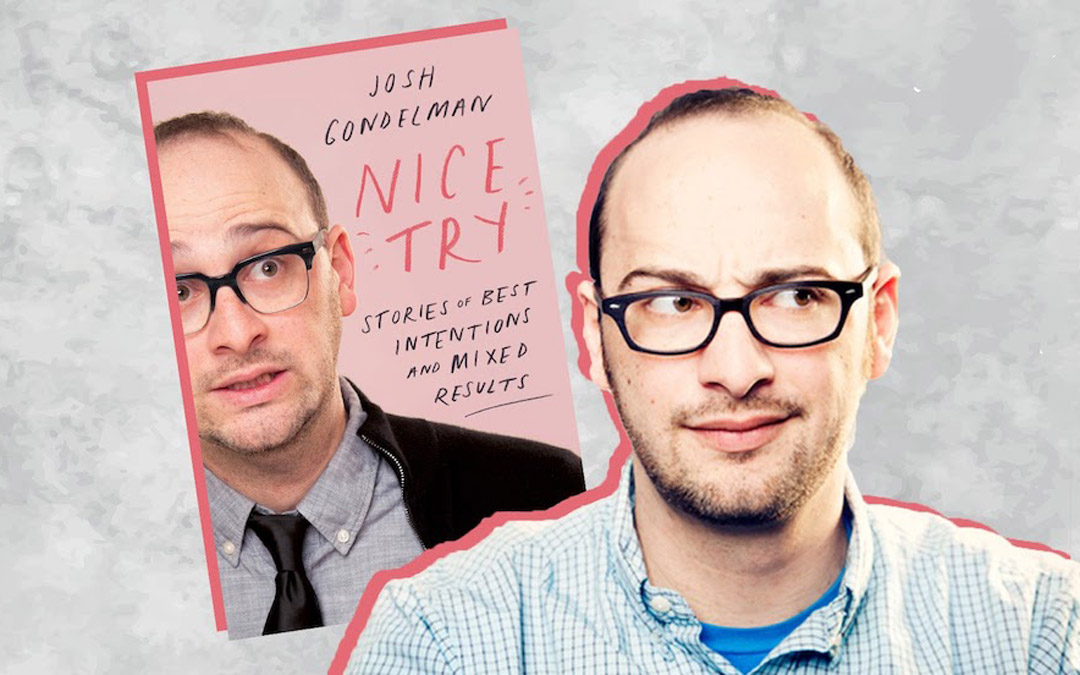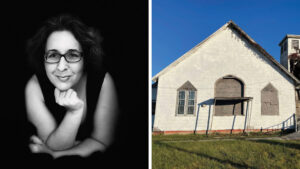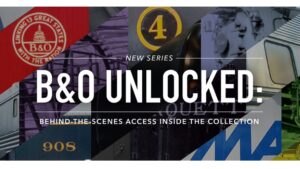Josh Gondelman wants you to know something about himself — he’s a nice Jewish guy.
“I’m Jewish. I was bar mitzvahed, and I enjoy the ritualized eating of carbohydrates. But more than that, I was raised nice,” he writes in the opening meditation on “nice guys” in his new book, “Nice Try: Stories of Best Intentions and Mixed Results” (Harper Perennial), which comes out this week.
In that way, Gondelman — who won three Emmys for his work on “Last Week Tonight with John Oliver,” and currently works as a writer and producer for the Showtime series “Desus & Mero” — is a bit of an outlier in the modern world of comedy, which often values mocking and R-rated themes.
Why open with talking about being a nice guy? “It sets the tone for the overall arc that’s going to happen,” says Gondelman. “There is a strong element of Judaism, which is obviously important to me, but the book really focuses on niceness versus goodness.”
It’s a deeply enjoyable arc. The essays cover everything from Jewish summer camp to working as a preschool teacher to romantic failures, and they are laugh-out-loud funny.
Which makes sense. In addition to working on those shows, Gondelman, 34, has also had a successful stand-up career, and back in 2012 started the popular Modern Seinfeld Twitter account, which won hundreds of thousands of fans by imagining what contemporary episodes of “Seinfeld” would involve.
A native of Stoneham, Mass., Gondelman recently spoke about the concept of “niceness,” his favorite Jewish holidays, the joys of sleepaway camp and his evolving thoughts on Twitter.
How do you distinguish between niceness and goodness?
Niceness is pleasantness and politeness and the kind of surface-level things you do to get by, which are important. And then goodness is kindness and righteousness, and sometimes it’s the same as niceness, and sometimes it’s in conflict.
You write about how your favorite part of Judaism is that time between Rosh Hashanah and Yom Kippur, and how you used to write a mass apology email.
It was a recurring thing that I did. I would try to be very sincere [and] email a lot of people in my life. It was a vast mass email. I would give a little primer on Yom Kippur, and then say so, in that spirit, if I have done anything that was hurtful to you that I didn’t realize, I want to say that I’m sorry and I would love to restore whatever was breached. It’s different than [writing], “I’m sorry if you were offended” because there’s a value to being like, “Hey, if I did something that I didn’t realize, like please let me know. This is the time where I would like to clean the slate.”
It’s nice to have a moment [where] it’s easy to explain why I am hitting the reset button today.
You write about going to sleepaway camp. How formative were those years for you?
Some of my best friends are the guys that I went to camp with those years. We’re still in super-close touch. I have a couple of close friends from high school and college, but numerically a disproportionate amount of the people that I still consider really close to my heart were the guys [from camp].
You write a lot about the impact of the Beastie Boys on you. Why do you think the Beasties were so important to you and other young Jews?
The Beastie Boys are like the cool Jewish kids that you know. They were visibly and clearly — by their proclamation and by their heritage — Jewish, but were also doing cool stuff. Their music was both really enmeshed in the broader hip-hop culture, but also didn’t feel like they were putting on airs or pretending to be people they weren’t. They were goofing around and having a good time. …
They’re very important to me. They felt like such an entry point into this world that I felt like I didn’t have access to; there was a point of commonality being white guys, but being Jewish guys specifically.
Your favorite Beastie Boys album?
Oh, man, I think it’s become “Paul’s Boutique.” It’s just so out there and so silly. I think [they] made it in L.A., but there are parts of it that [are] nitty-gritty New York stuff, so it feels like this weird hybrid of West Coast sonics and East Coast reference points.
Switching gears a little: What’s your relationship to Twitter these days?
I’ve had so much good fortune with it, professionally and personally. It’s like if you fell into a sewer and found $100, and you fell in a second time and found a diamond ring, and you’re like, wow, this sewer has been really good to me. Even though it is full of human waste.
Can you talk about the origins of your Modern Seinfeld account?
I started tweeting a couple things of, like, here are some Seinfeld plot lines that might happen if the show was on now. I was doing it kind of idly and my friend Jack saw it, and [said], “This should be its own thing.” He immediately jumped on the Twitter handle [@SeinfeldToday].
People really latched onto it, which was very incredible. It was a lark that turned into something that people really got into. … It was very nice to stand on the shoulders of giants in that respect.
What do you hope readers take away from “Nice Try”?
I hope that, first and foremost, they have a fun time reading it. That it feels warm and funny. I want people to enjoy it thoroughly, and to come away being like, wow, what a good time, I feel better than when I started because it was invigorating and entertaining.
The second thing is, I want people to take away that things are often hard and bad, [but] they can get better. There are things to latch onto amongst how difficult things are. One thing that is really inspiring to me is people doing really hard activist work, and people really standing up for what they believe in. So I hope that there’s like a little bit of encouragement.
Emily Burack is the associate editor of Alma and Kveller. This article was provided by the JTA global news source.





